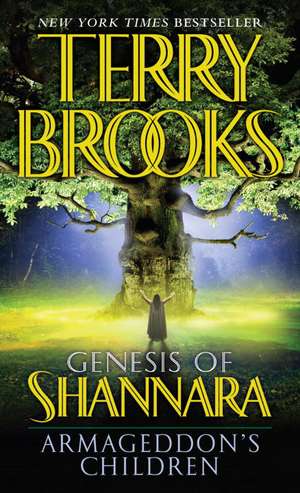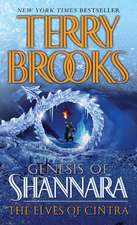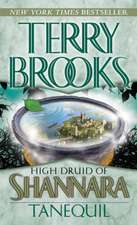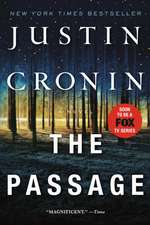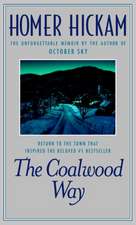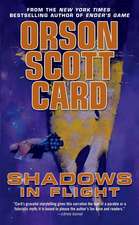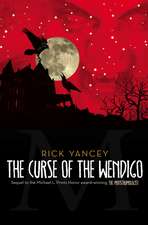Armageddon's Children: Genesis of Shannara, cartea 1
Autor Terry Brooksen Limba Engleză Paperback – 30 iun 2007 – vârsta de la 14 până la 18 ani
Logan Tom is doomed to remember the past and determined to rescue the future. Far behind him lies a boyhood cut violently short by his family’s slaughter, when the forces of madness and hate swept our world after decadent excesses led to civilization’s downfall. Somewhere ahead of him rests the only chance to beat back the minions of evil that are systematically killing and enslaving the last remnants of humanity. Navigating the scarred and poisoned landscape that once was America and guided by a powerful talisman, Logan has sworn an oath to seek out a remarkable being born of magic, possessed of untold abilities, and destined to lead the final fight against darkness.
Across the country, Angel Perez, herself a survivor of the malevolent, death-dealing forces combing the land, has also been chosen for an uncanny mission in the name of her ruined world’s salvation. From the devastated streets of Los Angeles, she will journey to find a place–and a people–shrouded in mystery, celebrated in legend, and vital to the cause of humankind . . . even as a relentless foe follows close behind, bent on her extermination. While in the nearly forsaken city of Seattle, a makeshift family of refugees has carved out a tenuous existence among the street gangs, mutants, and marauders fighting to stay alive against mounting odds–and something unspeakable that has come from the shadows in search of prey.
In time, all their paths will cross. Their common purpose will draw them together. Their courage and convictions will be tested and their fates will be decided, as their singular crusade begins: to take back, or lose forever, the only world they have.
In Armageddon’s Children, Brooks brings his gifts as a mythmaker to the timeless theme of the unending, essential conflict between darkness and light–and carries his unique imaginative vision to a stunning new level. Prepare for a breathtaking tour de force. To those who are new to Terry Brooks, welcome. And to those who have read him for many years: prepare for a dramatic surprise.
From the Hardcover edition.
| Toate formatele și edițiile | Preț | Express |
|---|---|---|
| Paperback (2) | 51.92 lei 3-5 săpt. | |
| Del Rey Books – 30 iun 2007 | 51.92 lei 3-5 săpt. | |
| Little Brown Book Group – 5 iul 2007 | 55.45 lei 3-5 săpt. | +30.35 lei 6-12 zile |
Preț: 51.92 lei
Nou
9.93€ • 10.43$ • 8.25£
Carte disponibilă
Livrare economică 21 martie-04 aprilie
Specificații
ISBN-10: 034548410X
Pagini: 404
Dimensiuni: 109 x 173 x 29 mm
Greutate: 0.2 kg
Editura: Del Rey Books
Seria Genesis of Shannara
Notă biografică
Terry Brooks is the New York Times bestselling author of more than twenty books, including The Sword of Shannara, the Voyage of the Jerle Shannara trilogy: Ilse Witch, Antrax, and Morgawr, the High Druid of Shannara trilogy: Jarka Ruus, Tanequil, and Straken, the nonfiction book Sometimes the Magic Works: Lessons from a Writing Life, and the novel based upon the screenplay and story by George Lucas, Star Wars®: Episode I The Phantom Menace™. His novels Running with the Demon and A Knight of the Word were selected by the Rocky Mountain News as two of the best science fiction/fantasy novels of the twentieth century. The author was a practicing attorney for many years but now writes full-time. He lives with his wife, Judine, in the Pacific Northwest and Hawaii. Visit the world of Shannara online at www.shannara.com and at Terrybrooks.net.
From the Hardcover edition.
Extras
He is fast asleep in his bed on the night that the demon and the once-men come for his family. They have been watching the compound for days, studying its walls and the routine of the guards who ward them. They have waited patiently for their chance, and now it has arrived. An advance party is over the walls and past the guards. They have opened the gates from the inside to let in the others, and now all are pouring into the compound. In less than five minutes, everything has been lost.
He doesn’t realize this when his father shakes him awake, but he knows something is wrong.
“Logan, get up.” Urgency and fear are apparent in his father’s voice.
Logan blinks against the beam of the flashlight his father holds, one of two they still possess. He sees his brother dressing across the way, pulling on his shirt and pants, moving quickly, anxiously. Tyler isn’t griping, isn’t saying anything, doesn’t even look over at him.
His father bends close, his strong features all planes and angles at the edges of the flashlight’s beam. His big hand grips his son’s shoulder and squeezes. “It’s time for us to leave here, Logan. Put on your clothes and your pack and wait by the trapdoor with Tyler. Your mother and I will be along with Megan.”
His sister. He looks around, but doesn’t see her. Outside, there is shouting and the sound of gunfire. A battle is being fought. He knows now what has happened, even without seeing it. He has heard it talked about all of his life, the day their enemies would find a way to break through, the day that the walls and gates and guards and defenses would finally give way. It has happened all across the United States. It has happened all over the world. No one is safe anywhere. Maybe no one will ever be safe again.
He rises quickly now and dresses. His brother already has his pack strapped across his back and tosses Logan his. The packs have been sitting in a corner of his bedroom for as far back as he can remember. Each month, they are unpacked, checked, and repacked. His father is a careful man, a planner, a survivor. He has always assumed this day would come, even though he assured his family it would not. Logan was not fooled. His father did not speak of it directly, but in the spaces between the words of reassurance were silent warnings. Logan did not miss them, did not ignore their implications.
“Hurry, slug,” Tyler hisses at him, going out the door.
He finishes fastening his boots, throws his pack over his shoulder, and hurries after his brother. The shouts are growing louder now, more frantic. There are screams, as well. He feels curiously removed from all of it, as if it were happening to people with whom he had no connection, even though these are his friends and neighbors. He feels light-headed, and there is a buzzing in his ears. Maybe he has gotten up too fast, has rushed himself the way he does sometimes without allowing his body to adjust to a sudden change.
Maybe it is just the first of many adjustments he is going to have to make in his life.
He knows what is going to happen now. His father has told them all, taking care to use the word if rather than the word when. They are going to have to escape through the tunnels and flee into the surrounding countryside. They are going to have to abandon their home and all their possessions because otherwise they will be caught and killed. The demons and the once-men have made it clear from the beginning that those who choose to shut themselves away in the compounds will not be spared once their defenses are breached. It is punishment for defiance, but it is a warning, too.
If you want to survive, you have to place yourself in our hands.
No one believes this is true, of course. No one can survive outside the compounds. Not as a free man or woman. Not with the plagues and poisons in the air, water, and soil. Not with the slave camps to take you in and swallow you up. Not with the Freaks and the monsters running amok in cities and towns and villages everywhere.
Not with the demons and once-men seeking to exterminate the human race.
Not in this brave new world.
Logan knows this even though he is only eight years old. He knows it because he is dreaming it, reliving it twenty years later. His understanding of its truths transcends time and place; he embraces the knowledge in the form of memories. He knows it the way he already knows how things will end.
He is standing with Tyler in front of the trapdoor when his father reaches them, ushering his mother and sister into place. “Stay together,” he tells them, glancing from face to face. “Look out for each other.”
He carries a short-barreled Tyson 33 Flechette, a wicked black metal weapon that when fired can tear a hole through a stone wall a foot thick. Logan has seen it fired only once, years ago, when his father was testing it. The sound of its discharge was deafening. There was a burning smell in his nose and a ringing in his ears afterward. The memory stays with him to this day. He is afraid of the weapon. If his father carries it, things are as bad as they can possibly be.
“Jack.” His mother speaks his father’s name softly, and she turns and takes him in her arms, burying her face in his shoulder. The shouts and screams and firing are right outside their door.
His father lets her hold him for a moment, then eases her away, reaches down, and flings back the trapdoor. “Go!” he snaps, motioning them in.
Tyler doesn’t hesitate; carrying the second of the two flashlights, he goes down through the opening. Megan follows him, her green eyes huge and damp with tears.
“Logan,” his father calls when he sees his youngest hesitate.
In the next instant the front door blows apart in a fiery explosion that engulfs both his mother and his father and sends him tumbling head-over-heels down the stairway to land in a twisted heap on top of his sister. She screams, and something heavy falls on the dirt floor next to him, barely missing his head. In the waver of Tyler’s flashlight he looks down and sees the Tyson Flechette. He stares at it until his brother jerks him to his feet and snatches up the weapon himself.
Their eyes meet and they both know. “Run!” Tyler grunts.
Together the three children hurry down the long dark corridor, following the beam of the flashlight. In the darkness ahead, other flashlight beams and flickering candles appear out of other tunnels that join this one, and the sound of voices grows louder. He knows they all come from homes close to his own. The tunnel was the joint project of many families, spearheaded by his father and a few other men, a bolt-hole in case of the unspeakable. Quickly the tunnels are packed, and people are pushing and shoving. Tyler, fighting to keep Megan in tow with one hand while wielding his flashlight with the other, shouts his name and shoves the Tyson Flechette at him.
Logan takes it without thinking. His hands close over the cool, smooth metal of the barrel and work down to the leather-bound grip. Curiously, the weapon feels right in his hands; it feels like it belongs there. His fear of it dissipates as he cradles it to his chest.
Ahead, there is a convergence of lights, and a wooden stairway leads upward. People are pouring out of the tunnel and up the steps into a night filled with flashes and explosions and the sounds of death and dying. He can feel the heat of an intense fire as he gains the opening. As he breathes in the night air, he can smell the acrid stench of smoke and charred timbers.
He has just paused to look around, not three steps back from Tyler and Megan, when an explosion rips the earth beneath him, flinging him backward into the night. An eerie silence descends over his immediate surroundings. Everything he hears now is distant and strangely muffled. He cannot see at first, cannot even move, lying on the ground clutching the flechette as if it were a lifeline.
He rises with difficulty, dazed and in shock. He sees bodies strewn everywhere on the ground in front of him, all around the tunnel opening, dozens and dozens of crumpled forms. He climbs to his feet and staggers over to where Tyler and Megan lie still and bleeding, their eyes wide and staring. He feels his chest tighten and his strength drain away. They are gone. His whole family is gone. It happened so fast.
Sudden movement catches his eye as a knot of dark forms converges on him from out of the darkness. Once-men, wild-eyed and feral, their faces the faces of animals. Without thinking, without even knowing how he remembers what to do, he snaps off the safety on the Tyson Flechette, whips up the barrel, and fires into their midst. Dozens of them disappear, blown backward into the night. He swings the barrel to the right and fires again. Dozens more fly apart. He is exhilarated, become as maddened as they are, as consumed by bloodlust. He hates them for what they have done. He wants to destroy them all.
Then he sees another figure, an old man standing off to one side, tall and stooped and ghost-gray in a cloak that hangs almost to the ground. His eyes are fixed on Logan, peering out from beneath a slouch-brimmed hat, and in those eyes is a cold approval that terrifies the boy. He does not understand what it is the old man approves of, but he does understand one thing. Without ever having come face-to-face with one before, he knows instinctively that this is a demon.
The demon smiles at him and nods.
A hand jerks him about sharply and whips the flechette out of his hands. Eyes as hard and black as obsidian stare out of a face streaked with grease and sweat. “Good enough, boy, but it’s time to leave now. Let’s live to fight another day!”
He takes Logan’s arm and begins to run with him into the darkness. Others with faces painted in the same way join with him, shepherding the strays they have gathered from the ruins of the compound. A rear guard forms up to protect their retreat, weapons firing into the waves of once-men that seek to reach them.
“Run, boy.” The man who holds him shoves him away.
Fighting down the pain he feels in his gut, struggling to hold back his tears, he does. He does not look back.
the midmorning sunlight blinded Logan Tom when he opened his eyes, and he blinked hard to clear away the sleep as he peered out through the windshield of the Lightning S-150 AV. The Indiana countryside, empty of life, spread away to either side of the little copse of elms he had pulled into the night before. The highway he had followed west toward Chicago stretched back the way he had come and ahead the way he must go, cracked and weed-grown and littered with debris. His gaze shifted. Fields fallow and dried out from weeks without rain formed a broken brown patchwork to the south. North, about half a mile off, a farmhouse and barn sat abandoned and derelict in a small grove of oaks turned wintry and leached of life.
On the four horizons, nothing moved. Not even feeders, and feeders were everywhere there were humans to consume.
He reached over for the staff, gripped it tightly for a moment, then ran his hands slowly along its polished black length, feeling the reassuring presence of the runes carved into its surface.
Another day in the world.
He checked the gauges of the AV, a cursory examination of several banks of lights that glimmered a uniform green in the daylight brightness. The red lights were dark, reassuring him that nothing had approached the vehicle during the night. He would not have slept through their audible warnings in any case, but it didn’t hurt to make sure. The assault vehicle was his favorite weapon against the things that hunted him, and he relied on her the way you relied on a best friend. Not that he had ever had a best friend. Michael had been his last real friend, but mostly he had been Logan’s teacher. It was Michael, a genius with anything mechanical, who had acquired and modified the AV. When he was gone, the Lightning had become Logan’s, a small legacy from a man larger than life.
He thought momentarily of his dream, of that last night with his family, with his childhood. Twenty years ago now, but it seemed an eternity.
Don’t dwell on it. Don’t give power of any kind to the past.
Satisfied that nothing threatened, he glanced at the solar battery readings. Full power. He was good to go. Solar had its advantages in a world in which the climates had been so drastically altered that the sun shone 350 days a year all the way from the equator to Canada. When you crossed the Mississippi, there was nothing but desert until you reached the mountains, then more of the same after that until you got close to the coast. The ozone layer had mostly burned away, the polar ice caps all but vanished. Temperatures had risen everywhere, and the land that had once been Middle America had turned stunted and dry. Old news; it had happened more than thirty years ago. So lots of sunshine was the forecast for today, tomorrow, and the next few centuries.
Rainfall? Six to eight inches a year in the wet spots.
Logan Tom wondered if anyone would ever again see anything that even resembled the old world. He thought it possible his descendants might, one extrapolated from the raw conditions of the present. But the world his parents and grandparents had known was gone forever, as dead as the moral and social fabric that had failed to hold it together. No one had thought it possible. No one had believed it could happen.
No one except the Knights of the Word, who had dreamed the nightmare and tried unsuccessfully to prevent it. Men and women conscripted to the cause, champions of and believers in the need to keep the magic that bound all things in balance.
For there was magic in the world, born out of the time before humankind, out of the world of Faerie, out of an older civilization. Magic that infused and sustained, that reached beyond what could be seen or even understood to tie together in symbiotic fashion all life.
Magic over which both the Word and the Void sought to exercise control.
It was an old struggle, one that dated all the way back to the birth of humanity. It was a struggle for supremacy between shadings of light and dark, between gradations of good and evil. Logan Tom didn’t pretend to understand all the nuances. It was enough that he understood the difference between a desire to preserve and a determination to destroy. The Knights, as servants of the Word, sought to keep the balance of the world’s magic in check; the demons, as creatures of the Void, sought to upset it. It was a simple enough concept to grasp and one easily embraced if you believed in good and evil—and most humans did. They always had. What they didn’t want to believe, what they tried repeatedly to dismiss, was that whatever good and evil existed in the world came from within themselves and not from some abstract source. It was easier to attribute both to something larger than what they knew, what they could see. A refusal to accept that it came from within was what had ultimately undone them.
The Knights and the demons understood this truth and sought, respectively, to reveal or exploit it. Both were born of the human race, evolved into something more by becoming what they were. Until the beginning of the end, humans hadn’t even known of their existence. Many still didn’t. Knights and demons were the stuff of urban legend and radical religions. No one saw them at work; no one could pick them out from other humans. Not until they had begun to reveal themselves and their cause. Not until the balance was tipped and the steady, purposeful destruction of all humankind a reality.
How hard it was for them to see the truth even then, when it was staring them in the face.
Even after the plagues had killed half a billion people, no one had believed. Even after the air was so polluted and the water was so badly fouled that it was dangerous either to breathe or drink, no one had believed. They had started to believe after the first nuclear weapons were launched and whole cities vanished in the blink of an eye. They had started to believe when the governments of countries collapsed or were overthrown, when chemical warfare attacks and counterattacks decimated entire populations. Enough so that they began turning what remained of their cities into walled compounds. Enough so that they retreated into a siege mentality that hadn’t abated as a way of life in thirty years.
It got worse, of course. When food and water started to dwindle, survival hinged on controlling what supplies remained and on acquiring new. But few knew how to forage adequately in a world poisoned and fouled so badly that even the soil could kill. Few knew how to develop new sources, and the demons got to those who did. A reticence to share with those less fortunate settled in, and the compounds became symbols of tyranny and selfishness. Those within were privileged, less threatened by hunger and thirst and sickness. Those without, some already beginning to change as their bodies adjusted to the poisons and the sicknesses that infected them, were labeled enemies for no better reason than that they had become different from everyone else.
Freaks, the regular humans called them. The street kids had given them other names—Lizards, Croaks, Spiders, Moles. Mutants. Abominations. They were called that and much worse. Infected by radiation and chemicals, they were the monsters of his time, banished to the ravaged land outside the walls of the compounds and left to their fate.
Logan Tom looked out across the Indiana flats, reached for the AV’s ignition, and turned it on. The engine purred softly to life, and he felt the thrum of her metal skin vibrate beneath his seat. After a moment, he engaged the clutch and steered out from the trees back onto the cracked surface of the road, heading west.
The real enemies were the once-men, humans subverted not by radiation and chemicals, but by false promises and lies that went something like this: “Do you want to know what it will take to survive? A willingness to do what is needed. The world has always belonged to the strongest. The weak have never been meant to inherit anything. You choose which you want to be in this life. By your choice, you are either with us or against us. Choose wisely.”
Demons had, of course, been telling those lies and making those false promises to humans for centuries. But those to whom the demons whispered were more willing to listen now. The world was a simple place in the aftermath of civilization’s destruction: either you lived within the compounds or you lived without. Those without believed those within weak and afraid, and they understood fear and weakness instinctively. They had been culled from the remnants of broken armies and scattered law enforcement bodies, from failed militias and paramilitary organizations, from a culture of weapons and battle, from a mind-set of hate and suspicion and ruthless determination. Once they embraced the propaganda of the demons, they fell quickly into the thicket of resulting madness. They changed emotionally and psychologically first, then mentally and physically. Layer by layer, they shed their human skin; they took on the look and feel of monsters.
Outwardly, they still looked mostly human—apart from their blank, dead eyes and their empty expressions. Inwardly, they were something else entirely, their humanity erased, their identity remade. Inwardly, they were predatory and animalistic and given over to killing everything that moved.
They were once-men.
Logan Tom knew these creatures intimately. He had seen good men who had changed to become them, some of them his friends. He had watched it happen over and over. He had never understood it, but he had known what to do about it. He had hunted them down and he had killed them with relentless, unshakable determination, and he would keep hunting and killing them and the demons that created them until either they were eradicated or he was dead himself.
It was the task he had been given in his service to the Word. It was, by now, the definition of his life.
He was not, he understood, so different than they were. He was their mirror image in so many ways that it frightened him. He might claim to occupy the moral high ground, that he was only doing what was right. He might rationalize it in any way he chose, but the result was the same. He killed them as they killed others. He was simply better at it than they were.
He drove west at a steady thirty miles an hour, careful to avoid the deeper cracks and potholes that had eroded the highway, steering past what looked to be the burned remains of fence posts used for fires and piles of trash blown in from the now empty farms. He hadn’t seen a single soul since he had left Cleveland yesterday. There were several compounds there, larger than most and heavily defended. The demons and the once-men were just now beginning to attack these, having wiped out almost all of the smaller enclaves. Soon enough they would eliminate the bigger ones, as well. Would have done so by now, perhaps, if not for the Knights of the Word.
If not for him.
Were there still others like him? He had no way of knowing. The Lady did not tell him in his visions of her, and he had not encountered another Knight in two years. He knew that at one time, others had fought as he did to stop the demon advance, but they were few and many had died. The last Knight he’d encountered had told him that on the East Coast, where the damage was the worst, they were all dead.
Midday came and went. He passed out of Indiana and into Illinois as the sun eased slowly toward the western horizon until eventually the skies began to turn a brilliant mix of gold and scarlet. His smile was bitter. One thing about air pollution: it provided some incredibly beautiful endings to your days. If you had to live in a poisoned world, you might as well enjoy the scenery.
He stopped the Lightning in the center of the highway and climbed out to watch the colors expand and deepen, taking the black staff with him. He stretched, easing the aching and stiffness he had developed in the confines of the AV’s cab. He had grown tall and lean like his father, exuding a rangy kind of strength. Scars crisscrossed his hands and arms, white slashes against his darker skin. He had sustained worse damage, but nothing that showed. Most of it was emotional. He was hardened from his years of service to the Word, by the pain and suffering he had witnessed and by the sense of aloneness he constantly felt. His face, like his father’s, was all edges and planes, a warrior’s face. But his mother’s gentle blue eyes helped to soften the harshness. Compassion reflected in those eyes, but compassion was a luxury in which he could not often afford to indulge. The demons and their kind did not allow for it.
He stared off into the distance past a broken line of crooked fence posts to where the darkness was beginning to creep over the landscape. A failing of the light had already turned the eastern horizon hazy. As he retied the bandanna that held back his long dark hair, he watched the shadows from the posts lengthen like snakes.
Then suddenly the late-afternoon breeze shifted, carrying with it the stench of death.
He followed his nose down the side of the road until carrion birds rose in a black cloud from the drainage ditch that had concealed them and he could see the remains of the bodies on which they had been feeding. He peered down at them, trying to reconstruct what had happened. Several families traveling on foot, he guessed. Dead several days, at least. Caught out in the open, dispatched, then dragged here. Hard to tell what might have gotten them.
Something big and quick. Something I don’t want to run into just now.
He returned to the Lightning, climbed back aboard, and drove on, following the fading light. The sky west was clear and still bright, so he left the headlights off. After a time, the moon came up, a narrow crescent off to the northeast, low and silvery. Once, the light revealed something moving through the blasted landscape, crouched low on all fours. Could have been anything. He glanced down at the AV’s readings, but they showed nothing, banks of green eyes shining up at him.
It took him less than an hour to reach the town. He was nearly all the way across Illinois, come to a place he had never been to before. But the Lady had made it clear that this was where she wanted him to go. She had visited him in his dreams, as she often did, providing him with directions and guidance, giving him what brief relief he found from the constant nightmares of his past. Once, another Knight had told him, they had dreamed of the future that would come to pass if they failed in their efforts to prevent it. Now there was no reason to dream of the future; they were all living it. Instead he dreamed of the darker moments of his past, of failures and missed opportunities, of losses too painful to relive anywhere except in dreams, and of choices made that had scarred him forever.
He hoped that after his business here was finished and it was time to sleep again, the dreams might let him be for at least one night.
Houses began to appear in the distance, dark boxes against the flat landscape. There were no lights, no fires or candles, no signs of life. But there would be life, he knew. There was life everywhere in towns this size. Just not the sort you wanted to encounter.
He eased the AV down the debris-littered highway toward the town, past broken signs and buildings with sagging roofs and collapsed walls. Out of the corner of his eye, he caught a glimpse of movement. Feeders. Where there were feeders, there were other things, too. He scanned the warning gauges on the Lightning and kept driving.
He passed a small green sign off to one side of the road, its lettering faded and worn:
WELCOME TO
Hopewell, Illinois
Population 25,501
Twenty-five thousand, five hundred and one, he repeated silently. He shook his head. Once, maybe. A hundred years ago. Several lifetimes in the past, when the world was still in one piece.
He drove on toward his destination and tried not to think further of what was lost and forever gone.
Two
Hawk walked point as the Ghosts emerged from their underground lair beneath what had once been Pioneer Square and set out on foot for midtown Seattle. It was an hour before midday, when trade negotiations and exchanges usually took place, but he liked to give himself a little extra time to cushion against the possibility of encounters with Freaks. Usually you didn’t see much of them when it was daylight, but you never knew. It didn’t pay to take chances. As leader, it was his responsibility to keep the others safe.
The city was quiet, the debris-littered streets empty and still. Storefronts and apartments stood deserted and hollow, their glass windows broken out and doors barred or sagging. The rusted hulks of cars and trucks sat where their owners had abandoned them decades ago, a few still in one piece, but most long since cannibalized and reduced to metal shells. He wondered, looking at them, what the city had been like when vehicles had tires and ran in a steady, even flow of traffic from one street to the next. He wondered, as he always did, what the city must have been like when it was filled with people and life. Nobody lived in the city now outside the walls of the compounds. Not unless you counted the Freaks and the street children, and no one did.
Hawk stopped the others at the cross streets that marked the northern boundary of Pioneer Square and looked to Candle for reassurance. Her clear blue eyes blinked at him, and she nodded. It was safe to continue. She was only ten years old, but she could see things no one else could. More than once, her visions had saved their lives. He didn’t know how she did it, but he knew the Ghosts were lucky to have her. He had named her well: she was their light against the dark.
He glanced momentarily at the others, a ragtag bunch dressed in jeans, sweatshirts, and sneakers. He had named them all. He had tossed away their old names and supplied them with new ones. Their names reflected their character and temperament. They were starting over in life, he had told them. None of them should have to carry the past into the future. They were the Ghosts, haunting the ruins of the civilization their parents had destroyed. One day, when they ceased to be street kids and outcasts and could live somewhere else, he would name them something better.
Candle smiled as their eyes met, that brilliant, dazzling smile that brightened everything around her. He had a sudden sense that she could tell what he was thinking, and he looked quickly away.
“Let’s go,” he said.
They set off down First Avenue, working their way past the derelict cars and heaps of trash, heading north toward the center of the city. He knew it was First Avenue because there were still signs fastened to a few of the buildings eye-level with the ornate streetlights. The signs still worked, even if the lights didn’t. Hawk had never seen working streetlights; none of them had. Panther claimed there were lights in San Francisco, but Hawk was sure he was making it up. The power plants that provided electricity hadn’t operated since before he was born, and he was the oldest among them except for Owl. Electricity was a luxury that few could manage outside the compounds, where solar-powered generators were plentiful. Mostly, they got by with candles and fires and glow sticks.
They stayed in the center of the street as they walked, keeping clear of the dark openings of the buildings on either side, falling into the Wing-T formation that Hawk favored. Hawk was at point, Panther and Bear on the wings, and the girls, Candle and River, in the center carrying the goods in tightly bound sacks. Owl had read about the Wing-T in one of her books and told Hawk how it worked. Hawk could read, but not particularly well. None of them could, the little ones in particular. Owl was a good reader. She had learned in the compound before she left to join them. She tried to instruct them, but mostly they wanted her to read to them instead. Their patience was limited, and their duties as members of the Ghosts took up most of their time. Reading wasn’t necessary for staying alive, they would argue.
But, of course, it was. Even Hawk knew that much.
Overhead, the sky began to fill with roiling clouds that darkened steadily as the Ghosts moved out of Pioneer Square and up toward the Hammering Man. Soon rain was falling in a soft, steady mist, turning the concrete of the streets and buildings a glistening slate gray. The rain felt clean and refreshing to Hawk, who lifted his angular face to its cool wash. Sometimes he wished he could go swimming again, as he had when he was a little boy living in Oregon. But you couldn’t trust the water anymore. You couldn’t be sure what was in it, and if the wrong thing got into your body, you would die. At least they had the rain, which was more than most of the world could say.
Not that he had seen much of that world. At eighteen, he had lived in exactly two places—in Oregon until he was five and in Seattle since then. But the Ghosts had a radio to listen to, and sometimes it told them things. Less so these days, as the stations dropped away, one by one. Overrun by the armies of the once-men, he assumed.
Once-men. Madmen.
Sometimes they learned things from other street kids. A new kid would show up, wandering in from some other part of the country to link up with one of the tribes and provide a fresh piece of news. But wherever they came from, their stories were pretty much alike. Everyone was in the same boat, trying to survive. The same dangers threatened everyone, and all you could do was decide how you wanted to live: either inside the compounds like a caged animal or out on the streets like prey.
Or, in the case of the Ghosts, you lived underground and tried to stay out of the way.
It was Owl who knew the history behind the underground city. She had read about it in a book. A long time ago, the old Seattle had burned and the people had buried her and built a new city right on top. The old city had been ignored until parts of it were excavated for underground tours. In the wake of the Great Wars and the destruction of the new city, it had all been forgotten again.
From the Hardcover edition.
Recenzii
“A great storyteller, Terry Brooks creates rich epics filled with mystery, magic, and memorable characters. If you haven’t read Terry Brooks, you haven’t read fantasy.”
–Christopher Paolini, author of Eragon and Eldest
“Terry’s place is at the head of the fantasy world.”
–Philip Pullman, author of The Golden Compass
From the Hardcover edition.
Descriere
Terry Brooks is one of a handful of writers whose work defines modern fantasy fiction. His twenty-three international bestsellers have ranged from the beloved Shannara series to stories that tread a much darker path. Armageddon’s Children is a new creation–the perfect opportunity for readers unfamiliar with Brooks’s previous work to experience an author at the height of his considerable storytelling powers. It is a gripping chronicle of a once-familiar world now spun shockingly out of control, in which an extraordinary few struggle to salvage hope in the face of terrifying chaos.
Logan Tom is doomed to remember the past and determined to rescue the future. Far behind him lies a boyhood cut violently short by his family’s slaughter, when the forces of madness and hate swept our world after decadent excesses led to civilization’s downfall. Somewhere ahead of him rests the only chance to beat back the minions of evil that are systematically killing and enslaving the last remnants of humanity. Navigating the scarred and poisoned landscape that once was America and guided by a powerful talisman, Logan has sworn an oath to seek out a remarkable being born of magic, possessed of untold abilities, and destined to lead the final fight against darkness.
Across the country, Angel Perez, herself a survivor of the malevolent, death-dealing forces combing the land, has also been chosen for an uncanny mission in the name of her ruined world’s salvation. From the devastated streets of Los Angeles, she will journey to find a place–and a people–shrouded in mystery, celebrated in legend, and vital to the cause of humankind . . . even as a relentless foe follows close behind, bent on her extermination. While in the nearly forsaken city of Seattle, a makeshift family of refugees has carved out a tenuous existence among the street gangs, mutants, and marauders fighting to stay alive against mounting odds–and something unspeakable that has come from the shadows in search of prey.
In time, all their paths will cross. Their common purpose will draw them together. Their courage and convictions will be tested and their fates will be decided, as their singular crusade begins: to take back, or lose forever, the only world they have.
In Armageddon’s Children, Brooks brings his gifts as a mythmaker to the timeless theme of the unending, essential conflict between darkness and light–and carries his unique imaginative vision to a stunning new level. Prepare for a breathtaking tour de force. To those who are new to Terry Brooks, welcome. And to those who have read him for many years: prepare for a dramatic surprise.
From the Hardcover edition.
